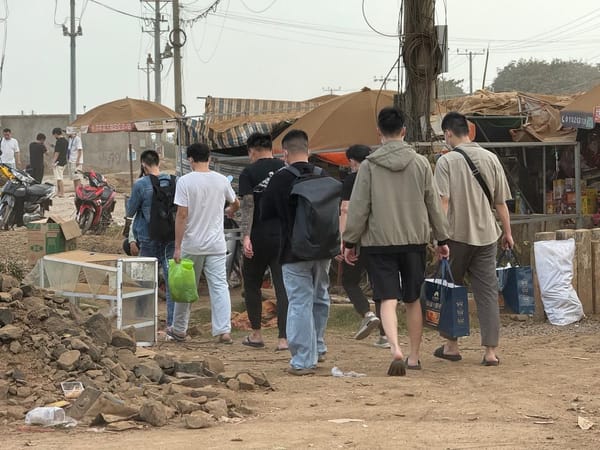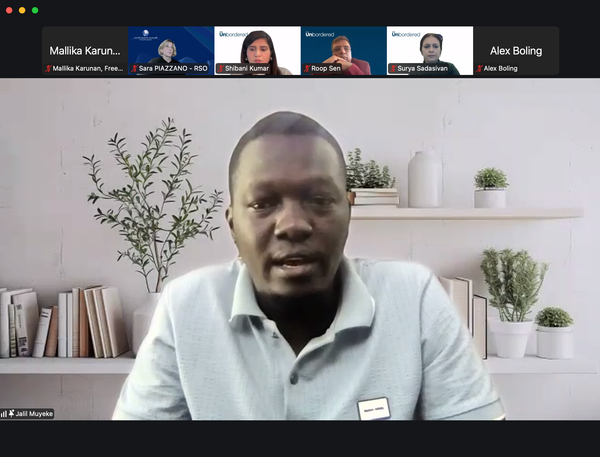Leaked proposed legislation seeks to significantly scale back EU due diligence laws
The European Commission plans to water down EU businesses’ human rights obligations, a new analysis highlights cases of forced labour across hundreds of global companies, and a report explores the ongoing vulnerability of displaced people from Ukraine.

A draft law from the new European Commission, expected tomorrow, will propose significant cuts to the European Union’s human rights and environmental reporting obligations, according to a section of the upcoming omnibus legislation obtained by POLITICO.
The legislation aims to scale back three of the bloc’s major legal frameworks affecting businesses, including the corporate sustainability due diligence directive (CSDDD), which requires them to investigate and address human rights and environmental abuses in their global supply chains. If approved, a large cohort of businesses could be exempt from complying with corporate sustainability reporting rules, bringing only the largest companies under the regulations, the leaked document shows. Requirements to monitor environmental and human rights abuses throughout companies’ global supply chains, meanwhile, could be considerably reduced.
The original due diligence law — passed in 2024 and only due to be implemented incrementally from 2027 onwards — requires companies to look deep into their supply networks to identify and act on activities that harm the environment and violate human rights. However, the proposed revisions significantly scale back and weaken these measures across various areas. For instance, companies would no longer have to look beyond suppliers with which they have a direct business relationship, would only be expected to monitor suppliers once every five years – down from annually – and would no longer be forced to terminate relationships with suppliers which fail to improve their behavior. Additionally, the revisions would prevent countries from adopting stricter laws, setting maximum harmonization across the EU that limits national flexibility.
Other key rollbacks include weakened stakeholder rights, restricting engagement to those “directly” affected and excluding national human rights institutions and environmental NGOs. Climate plan requirements would be watered down – companies would need to draft plans but not necessarily implement them. Enforcement mechanisms would also be weakened, with the removal of minimum penalties and civil liability left to national discretion, potentially allowing member states to exclude liability entirely. Financial institutions would escape further due diligence obligations and, finally, delays in implementation are expected, with key guidance pushed to mid-2026.
European Commission President Ursula von der Leyen had previously trailed the legislation, announcing in November that, in order to improve EU competitiveness, she would reduce reporting requirements for companies by 25 per cent and introduce an omnibus proposal that could weaken the CSDDD and other corporate sustainability reporting and classification laws adopted during her first mandate leading the commission.
Civil society organizations warned that such a bill could act as a “Trojan horse” for political groups opposed to the law to remove important climate and human rights provisions from the CSDDD once back in parliament, calling for the EU to show leadership in the protection of human rights, the environment and climate, and for the Commission to clarify its intentions. Meanwhile Human Rights Watch (HRW) said the EU should instead “look to create a human rights economy, where it would be responsible for prioritizing the long-term greater interest of people and the planet through equitable distribution of resources and environmental sustainability over maximization of profits for the benefit of a few.” It added that, “…instead of revisiting these essential laws, the European Commission and member states should work to integrate them into national law and enforce them. The EU should encourage a race to the top to protect human rights, the environment, and climate, all while providing companies with a level playing field through clear expectations, legal certainty, and timely and comprehensive guidelines on implementation.”
HRW also pointed out that, while company lobbyists and conservative politicians argue that compliance costs and reporting obligations are too expensive and stifle businesses, data shows that the cost of due diligence for large companies is less than 0.01 per cent of their revenue while, between 2016 and 2023, the largest listed EU-based companies made enough profit to distribute US$1.501 trillion to their shareholders.
Once out, the proposed amendments will require approval from member countries in the Council of the EU and from lawmakers in the European Parliament.
Here’s a round-up of other noteworthy news and initiatives:
The Business & Human Rights Resource Centre’s latest global analysis documents 665 cases of migrant worker abuse in 2024, linking 489 companies, including Meta, Uber, Carrefour, Honda, Toyota, and Foxconn, to allegations of wage theft, unsafe working conditions, exploitative recruitment fees, and forced labour across global supply chains. The report underscores the urgent need for stronger human rights due diligence, migrant worker-centered protections, and regulatory enforcement, particularly in the agriculture, construction, and manufacturing sectors.
As Russia’s full-scale invasion of Ukraine reaches its third anniversary, a new report by La Strada International highlights the ongoing vulnerability of displaced people from Ukraine to human trafficking, with labour exploitation being the most common form among the 42 cases assessed. Despite prevention efforts and access to rights, refugees remain at risk, especially as political momentum weakens, necessitating stronger protections, sustainable housing, and employment opportunities.
This article provides important documentation showing how trafficking in persons, violence, and coercion remain central to cyber-scam center operations in Myanmar. As Thailand ramps up its response, survivor accounts reveal the systemic brutality within these Chinese-led transnational crime networks, underscoring challenges in weakening the industry and the critical need for adequate victim support processes.
A new report by Environmental Justice Foundation details how Chinese fishing fleets have been using North Korean forced labour in violation of UN sanctions, with workers trapped at sea for years under severe restrictions. The findings highlight China’s distant-water fishing industry’s links to forced labour and illegal practices, raising concerns about supply chain transparency and regulatory enforcement.
This article by the Global Initiative Against Transnational Organized Crime examines how increasing repression of press freedom in Asia and Oceania is weakening efforts to combat organized crime. It highlights the case of Cambodian journalist Mech Dara, who was arrested for reporting on corruption and online scams, illustrating a broader trend of governments targeting media professionals.
This Chatham House analysis examines how Libya’s conflict has entrenched migrant smuggling and trafficking, fueling violence and an illicit economy. It critiques European policies, arguing that border militarization and deals with Libyan armed groups have failed to address root causes, allowing exploitation and smuggling networks to persist.
Amid recent shifts in the foreign aid funding landscape, we invite civil society groups to sign our joint statement calling for stakeholders to urgently step up and safeguard the future of anti-trafficking work.




